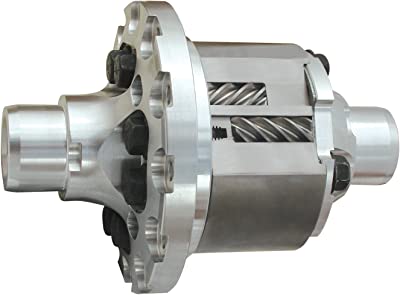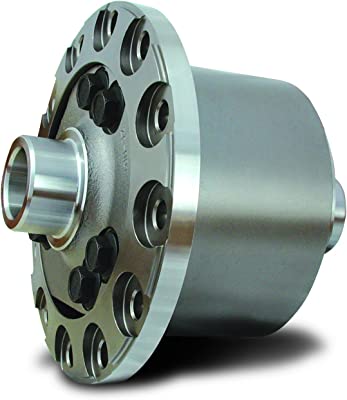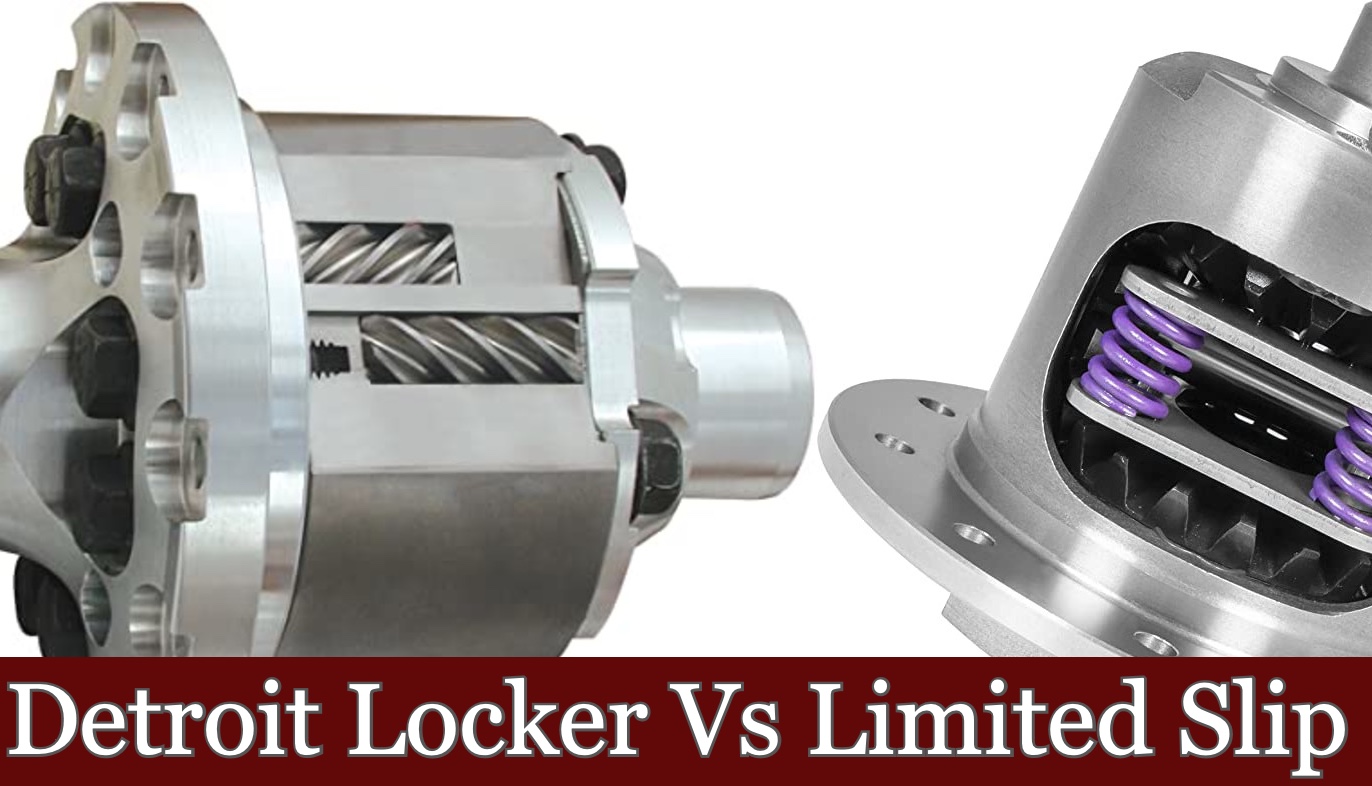If you’re one off-roader who wants to conquer the most challenging conditions with your 4WD, you might consider adding some safety features to your vehicle. In this case, adding traction comes first.
However, when we think of traction, Detroit Locker vs. Limited Slip is a common scenario that often confuses general buyers. So, locking the differential or having the Limited Slip alternative is better? Yes, we will find the truth here.
Detroit Locker Vs Limited Slip In a Table
| Feature | Detroit Locker | Limited Slip |
|---|---|---|
| Function | Automatically locks/unlocks wheels under load. | Limits slip between wheels, doesn’t fully lock. |
| Mechanism | Mechanical locking system. | Uses clutches or gears to distribute torque. |
| Traction Enhancement | Limits slip between wheels doesn’t fully lock. | Improved traction, allows some wheel speed variation. |
| Performance | Best for extreme off-road or racing. | Suitable for a variety of driving conditions. |
| Operation | Varies, are often more affordable than full lockers. | No driver input is needed, automatic. |
| Vehicle Handling | Can be abrupt, noticeable in turns. | Smoother, more predictable handling. |
| Noise | Can be noisy during operation. | Generally quieter than lockers. |
| Tire Wear | Higher tire wear due to locking nature. | Less tire wear compared to full lockers. |
| Suitability | Ideal for hardcore off-road, drag racing. | Good for daily driving, light off-road. |
| Cost | Generally higher due to design complexity. | Maximum traction locks wheels together. |
| Ease of Driving | Requires experience, especially on pavement. | Easier to drive on various surfaces. |
| Maintenance | Robust, low maintenance. | Clutch types may require maintenance over time. |
What Is A Detroit Locker?

Detroit Locker is a variable-lock differential that provides excellent traction. It locks automatically when the accelerator pedal is released, giving full authority for superior towing circumstances. It is useful in especially severe circumstances such as high cliffs or mountain passes.
Pros
- Maximum traction in off-road conditions
- Automatic locking without driver input
- Durable and robust design
- Low maintenance
- Excellent for extreme sports like drag racing
Cons
- Noticeable noise during the operation
- Abrupt engagement can affect the handling
- Increased tire wear
- Not ideal for everyday driving on regular roads
- Can be challenging to use for inexperienced drivers
What Is A Limited Slip Differential?

A limited-slip differential (LSD) is a new mechanical device attached to the rear of a vehicle’s drive axle. It minimizes traction loss and provides optimum power distribution when the wheel that’s spinning needs more power or traction. It redistributes power separately from wheel to wheel in the presence of significant wear or other irregularities.
Pros
- Improves traction in various driving conditions
- Provides smoother handling than lockers
- Less tire wear compared to full lockers
- Better for daily driving on regular roads
- Automatic operation with some driver-controlled types
- Suitable for performance vehicles
Cons
- Less effective in extreme off-road conditions
- Clutch-type can require periodic maintenance
- Generally more expensive than open differentials
- May not provide as much traction as a full locker in certain situations
- Complexity can vary based on design (clutch-type vs gear-type)
Detroit Locker Vs Limited Slip – Factors to Compare
So, what’s the difference between an LSD and a locker? And which one should you choose for your car? Here are four factors to consider.
Torque Balance
With a Detroit Locker, you’ll always get balanced torque under severe conditions. However, in the case of Limited Slip, the torque is not always balanced. Like a manual transmission, the Limited Slip differential allows the wheels to rotate at different rates, but a limited-slip differential allows torque from only one wheel to be replicated to the other wheel for continued traction. In other words, the differential is said to bias more torque to the traction-providing tire.
Working Mechanism
The major internal parts of a Detroit Locker side gear, outer spring, driven clutch assembly, spider assembly, and center cam are kept in the part known as the spider assembly. The spider assembly is confined by a gear flex, however, it is not locked in place. This part that’s designed to replace a center cam in a used forward-facing differential lets the assembly rotate freely.
The driven clutches in between the side gears share traction input with the driven wheels, which are splined to fit the axles and turn at the same speed as the axles. When the vehicle moves under power, both side gears are wound in at least one of the axles. Although each driven wheel imparts approximately the same amount of traction, one axle gets more power.
On the contrary, the limited-slip differential principle was designed as a tool to exert more control over machinery and increase efficiency across different ranges of speed. An open differential uses gears to alter the speed of wheels as they go around corners, and when lots of power is delivered, it’s simple for the open diff to lose speed or be overcome.
When power is delivered to the wheels, it looks for the path of the least resistance, meaning the tire with the least grip on that occasion. If you’re heavy on the accelerator in a powerful car, this can mean all the available power dissipates in a cloud of smoke as the unloaded tire spins away while the remainder of the tire continues to hold the grip.
Street Use
While a number of people use the Detroit Locker on minor streets, this aggressive traction aid is intended primarily for off-street, large-scale use. Eaton also produces truck applications with specific and varying needs.
An LSD unit can be customized to increase a car’s power and speed by making use of the automobile’s engine to its greatest potential. Even on ordinary surfaces, an LSD unit can avert skidding and spinning to provide optimal traction that ensures a smoother, safer ride.
Snow Performance
A Detroit Locker is very useful for crossed ice because it makes for equal movement among the wheels of the vehicle in poor driving conditions like driving in the snow. It makes it possible for you to gain traction when driving in the wet during poor weather.
Limited Slip diffs can be helpful to catch additional traction, but at the top of an icy slope, they will be a negative choice, as on the crown or the shoulder of a road, for instance.
Performance in Mud
The Limited Slip causes the brake power to originate at the rotating wheel, which might not at all be practical if you find yourself stuck in mud or snow. Whilst, a Detroit Locker locks both rear wheels regardless of unit rotation.
Lockers will help you out in the mud. Nevertheless, while the front is locked, it is difficult to pivot, and you may need to inject the wheel to get released. Therefore, it is recommended to make use of it as often as needed.
Detroit Locker Vs Limited Slip – Which One Is Better for You?
So, which one is better for you? Based on where your vehicle travels to the greatest extent, the answer can vary. However, not every differential is created equal. A radial weight bias, left-side bias, or open differential may be notably more productive for your all-wheel-traffic vehicle, as each differential can supply all the power to both wheels instead of only having sufficient power to one.
So, if you’re a drag racer looking for the best traction for the strip, you might want to contemplate the Detroit Locker as it will handle nearly all the power you throw at it directly. If you are an avid Autocrosser road racer, you might want the Limited Slip differential to provide the best possible traction for straight line and cornering.
Final Words
At the end of the Detroit Locker vs. Limited Slip battle, it’s clear that the Detroit differential locker is better than the Limited Slip differential for a number of reasons. The Detroit differential locker has a longer life span and is less likely to wear out. Additionally, the Detroit differential locker is more efficient in terms of torque and horsepower. Finally, the Detroit differential locker is easier to work on and can be serviced with basic automotive tools.
Read also:
